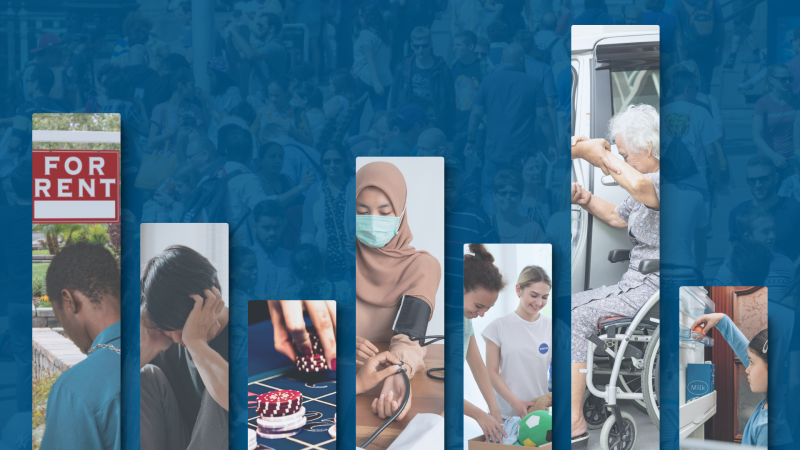Health inequities abound in California, according to newest California Health Interview Survey

Differences in race and ethnicity, income level, and sexual orientation and gender identity continued in 2023 to be linked to differences in equitable experiences across a range of health-related issues affecting Californians, according to the UCLA Center for Health Policy Research’s latest California Health Interview Survey (CHIS).
Housing discrimination was one of many topics added in 2023 to the nation’s largest state health survey, which since 2001 has collected data and highlighted gaps in health and health care access to help inform budgeting, advocacy, and legislation. Collecting data about topics like discrimination and housing insecurity enhances researchers’ understanding of how people’s day-to-day experiences are associated with health outcomes.
Among adults, 4.6% said they experienced housing discrimination in the last two years. The data showed that 9.4% of Black or African American adults experienced housing discrimination, which was more than four times higher than white adults (2.3%). CHIS also showed that 7.6% of multiracial adults, 6.9% of Latinx adults, and 2.5% of Asian adults experienced housing discrimination.
Adults who speak one or more languages other than English at home said they experienced housing discrimination at almost twice the proportion of adults who speak only English at home (6% versus 3.5%). People whose income was less than 200% of the federal poverty level ($60,000 for a family of four in 2023) experienced housing discrimination at more than twice the rate of people earning more than that (8% versus 3.1%), according to CHIS.
Other new topics included gambling, unintended pregnancy, adolescents’ college plans, adolescents’ sexual orientation, and children’s gender identity, among others.
Gambling is associated with a risk of poor health outcomes and mental health problems
Researchers learned that about 25% of California adults said they gambled in the past year, and of those individuals, 6.7% reported they had symptoms of problem gambling.
“These new topics provide policymakers, researchers, journalists, community advocates, and the public additional verified data to help them better understand the challenges facing California’s diverse population,” said Ninez Ponce, principal investigator of CHIS and director of the UCLA Center for Health Policy Research (CHPR). “CHIS data can serve as a critical resource to figure out which groups’ needs are not being met by current policies and programs.”
CHIS showed in 2023 that 51.8% of noncitizen adults, including those with green cards, were covered by Medi-Cal, up from 41.1% the previous year. In May 2022, the state expanded Medi-Cal — the program that provides health insurance to low-income Californians — to offer full benefits to qualifying adults 50 or older without regard to immigration status.
Police stops down except for Black or African American adults
CHIS data also showed a disturbing pattern of how race and ethnicity correlate to being stopped by police. While the numbers for all California adults who were stopped by police in the last year decreased from 20% in 2022 to 16.8% in 2023, the numbers for Black or African American adults increased from 26.7% to 30.2%. All other races and ethnicities reported a decrease in police stops from 2022 to 2023.
“Disaggregating data by race and ethnicity exposes inequities in our systems and in people’s experiences,” said Todd Hughes, director of the California Health Interview Survey.
Key findings
The 2023 survey included responses from 21,671 adults, 968 adolescents, and 3,377 children, and covered health topics and topics that influence health — among them, access to and use of health care, health insurance, health conditions, mental health, food insecurity, housing, child care, caregiving, discrimination, firearm safety and gun violence, and climate change.
Adult Californians with U.S. citizenship who are struggling more with basic needs like housing and income are less likely to be engaged with national, state and local elections.
- 65.7% of those with stable housing said they were always or frequently engaged in national, state, and local elections, compared with 48.8% of those without stable housing.
- 71.8% of those earning more than 200% of the federal poverty level were always or frequently engaged in elections, compared with 47.1% of those earning less than 200% of the federal poverty level.
In a new question added for 2023, CHIS asked adolescents (ages 12–17), in addition to adults, about their sexual orientation. The survey also added a question about the gender identity of children under age 12.
- Among adolescents ages 13.3% said they were gay, lesbian, bisexual, pansexual, or used a different term, compared with 9.3% of adults.
- 67.8% of gay or lesbian adolescents reported experiencing serious psychological distress in the past year, compared with 23.2% of straight adolescents.
- For children, 99.6% reported being cisgender and 0.4% reported being transgender or gender expansive.
Also new in 2023 were questions about unintended pregnancy.
- 4.4% of sexually active women ages 18–44 reported an unintended pregnancy in the past year.
- Women earning less than 200% of the federal poverty level ($60,000 for a family of four in 2023) were more than twice as likely to have an unexpected pregnancy compared with women earning more than that, 7.5% versus 3%.
Mental health concerns
Though the proportion of adults reporting serious psychological distress was returning to pre-pandemic levels (13% in 2019, peaking at 17% in 2021, and 13.9% in 2023), mental health and access to care remain concerning for some groups.
- For Asian adults, rates of serious psychological distress remain above pre-pandemic levels (9.7% in 2019, peaking at 14.5% in 2021, and 12.8% in 2023).
- Rates of severe social impairment due to emotions in the past 12 months remain high for Black or African American adults (9.6% in 2019 and in 11.6% in 2023) and Asian adults (7.2% in 2019 and 8.9% in 2023).
- Adults with unstable housing were more than twice as likely to say they had serious psychological distress in the past year compared with adults in stable housing, (30% versus 13.1%).
- 30.6% of adult respondents who didn’t get the emotional help they needed said it was because of the difficulty getting an appointment.
- 24.7% of adults in 2023 reported needing help for emotional/mental health or an alcohol or drug problem in the past year. In 2020, the figure was 20.9%.
Two other categories that showed widening inequity in California were food insecurity and medical debt.
- Almost half (44.5%) of California adults earning less than 200% of the federal poverty level in 2023 reported being unable to afford enough food. This figure has increased every year since 2020, when it was 35.8%.
- More than half of adults who had problems paying their medical bills in the past year reported incurring credit card debt to pay their medical expenses. This percentage has grown from 45.2 in 2020 to 56.3% in 2023.
“As part of a public university, it’s not just our mission at the UCLA Center for Health Policy Research to make our research available to the public, it’s a moral imperative,” Ponce said. “We’re thankful to the people who participated in the survey. It is our sincere hope that people will use our data to create evidence-based solutions to our serious problems.”








